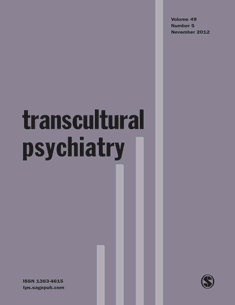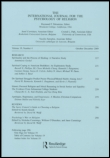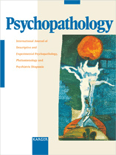
Journal of Psychedelic Studies
Scope & Guideline
Exploring the Frontiers of Psychedelic Research
Introduction
Aims and Scopes
- Psychedelic-Assisted Therapy:
Research on the efficacy and methodology of psychedelic-assisted psychotherapy, including various therapeutic models and their application in treating mental health disorders. - Cultural and Historical Contexts:
Exploration of the cultural, historical, and anthropological perspectives on psychedelics, including indigenous practices and the evolution of societal attitudes towards these substances. - Psychological and Phenomenological Studies:
Investigations into the subjective experiences of individuals using psychedelics, including mystical experiences, personality changes, and the psychological mechanisms at play. - Neuroscience and Pharmacology:
Studies examining the neurobiological effects of psychedelics, including their impact on brain chemistry, psychological well-being, and potential therapeutic targets. - Ethics and Policy:
Discussion of the ethical implications and regulatory challenges surrounding the medicalization and recreational use of psychedelics.
Trending and Emerging
- Psychedelic Integration and Therapy:
An increasing number of studies focus on the integration of psychedelic experiences into therapeutic settings, emphasizing the importance of preparation and integration for successful outcomes. - Indigenous Practices and Knowledge:
Research examining indigenous psychedelic practices is gaining traction, highlighting the importance of traditional knowledge in contemporary therapeutic contexts and the need for respectful engagement with these cultures. - Microdosing Research:
The trend of investigating microdosing as a potential therapeutic and enhancement tool is on the rise, with studies exploring its effects on mental health, emotional insight, and everyday functioning. - Social Justice and Equity in Psychedelic Culture:
There is a growing focus on equity and social justice within psychedelic research, addressing issues of accessibility, representation, and the impact of historical injustices on current practices. - Psychedelics and Mental Health in Non-Clinical Populations:
Emerging themes explore the use of psychedelics for enhancing well-being in healthy individuals, indicating a broader understanding of their potential benefits beyond clinical disorders.
Declining or Waning
- Traditional Recreational Use:
Research focusing on the recreational use of psychedelics, particularly in festival settings, has decreased, suggesting a shift towards more clinical and therapeutic applications. - Basic Pharmacological Studies:
Basic studies on the pharmacology of psychedelics without a clinical or therapeutic context seem to be less frequent, indicating a move towards applied research that emphasizes therapeutic potential. - Historical Anecdotes:
Papers that primarily recount historical anecdotes or personal experiences related to psychedelics are becoming less common, as the journal prioritizes empirical research and structured studies.
Similar Journals

Transcultural Psychiatry
Innovating Insights in Transcultural PsychiatryTranscultural Psychiatry is a leading interdisciplinary journal published by SAGE Publications Ltd, dedicated to advancing the understanding of the interplay between culture and mental health. With a storied history dating back to 1964 and converging until 2024, this esteemed journal holds a prominent position in the field, as evidenced by its Q1 ranking in Health (Social Science) and Q2 in Psychiatry and Mental Health. It ranks #71 in Scopus within the social sciences domain, reflecting its vital contribution to academia, with an 80th percentile standing that underscores its impact. Although it is not open access, Transcultural Psychiatry is committed to providing valuable insights and research relevant to scholars, healthcare practitioners, and policymakers engaged in culturally informed mental health practices. Through rigorous scholarly articles, the journal aims to bridge cultural understandings and promote global dialogue on psychiatric practices, making it an essential resource for anyone interested in transcultural dimensions of mental health.

International Journal for the Psychology of Religion
Bridging the Gap between Psychology and SpiritualityWelcome to the International Journal for the Psychology of Religion, a leading academic platform dedicated to the exploration of the intricate relationship between psychological processes and religious beliefs. Published by Routledge Journals, Taylor & Francis Ltd, this esteemed journal serves as an essential resource for researchers, professionals, and students in the fields of psychology and religious studies. With an impressive impact factor and a robust Scopus ranking, including a Q1 classification in Religious Studies and a Q2 in miscellaneous Psychology categories, it stands out for its rigorous academic contributions. The journal's scope has evolved over the years, maintaining its relevance since its inception in 1991 and continuing to present innovative research through 2024. While primarily subscription-based, it encourages submissions that push the boundaries of understanding in both disciplines. Engage with cutting-edge studies that illuminate the psychological dimensions of religious practices, belief systems, and their impacts on human behavior.

PSYCHOPATHOLOGY
Pioneering Insights into Mental Health DisordersPSYCHOPATHOLOGY, published by KARGER, is a prestigious academic journal that has been a cornerstone in the fields of clinical psychology and psychiatry since its inception in 1968. With a robust impact factor and a commendable ranking within the upper quartiles (Q1) of its categories for 2023, the journal is recognized for its rigorous peer-reviewed articles that contribute significantly to the understanding and treatment of mental health disorders. Hailing from the beautiful country of Switzerland, this journal not only fosters innovative research but also encourages interdisciplinary collaboration among scholars, practitioners, and students alike. Although currently not an Open Access journal, it continues to provide valuable insights, enhancing the understanding of psychopathological phenomena and promoting better clinical practices. With a commitment to excellence, PSYCHOPATHOLOGY aims to disseminate crucial findings and innovative methodologies that shape the future of mental health research.

Psychoanalysis Self and Context
Transforming Understanding of Self within Contextual FrameworksPsychoanalysis Self and Context is a dynamic journal published by Taylor & Francis Inc that delves into the intricate realms of psychoanalysis, clinical psychology, and mental health. Established in 2017, this journal seeks to explore the profound connections between individual experiences and broader psychological frameworks, fostering a nuanced understanding of the self within various contexts. With an ISSN of 2472-0038 and an E-ISSN of 2472-0046, it is committed to scholarly excellence, as evidenced by its current Q3 rankings in both Clinical Psychology and Psychiatry and Mental Health for 2023. Despite its relatively short history, it has positioned itself as a noteworthy contribution within the field, ranked #237 in Clinical Psychology and #455 in Psychiatry and Mental Health by Scopus. The journal is crucial for researchers, practitioners, and students alike, offering valuable insights and rigorous discourse that contribute to the advancement of psychological science and therapeutic practices. With a comprehensive scope that aims to bridge theoretical concepts and practical applications, Psychoanalysis Self and Context serves as an indispensable resource for those dedicated to understanding the complexities of the human mind.

Horror Studies
Decoding the Dark: Insights into Horror's ImpactHorror Studies, published by INTELLECT LTD, is a pivotal interdisciplinary journal dedicated to the exploration of the horror genre across various artistic mediums, including literature, music, visual arts, and performing arts. Since its inception in 2014, the journal has established itself as an essential resource for scholars and practitioners, facilitating critical discourse on the cultural, historical, and psychological aspects of horror. With an impressive Scopus ranking, placing it in the top quartile for literature and literary theory (Rank #188 out of 1106, 82nd percentile), and maintaining a Q3 category across all relevant areas, Horror Studies offers a platform for innovative research that engages with contemporary issues and the evolution of horror as a cultural phenomenon. Researchers and students alike will find value in its robust articles that analyze horror not just as a genre, but as a lens through which societal fears and anxieties are projected and examined. Although Horror Studies is not available as an open-access journal, its insights continue to make meaningful contributions to the scholarly landscape, promoting a deeper understanding and appreciation of horror's complex interplay with humanity.

International Forum of Psychoanalysis
Connecting Scholars and Practitioners in PsychoanalysisInternational Forum of Psychoanalysis, published by Routledge Journals, Taylor & Francis Ltd in the United Kingdom, is a pivotal platform for scholarly discourse in the field of psychoanalysis. Since its inception in 1992, this journal has offered a unique intersection of theoretical and empirical perspectives, catering to researchers, clinicians, and students interested in advancing the understanding of psychoanalytic principles and their clinical applications. With an impact factor reflective of its specialized niche and ranked Q3 in Clinical Psychology and Q4 in Psychiatry and Mental Health, the journal plays a critical role in disseminating cutting-edge research that informs best practices in mental health. Although it does not currently offer open access, the International Forum of Psychoanalysis continues to be an essential resource for those seeking to deepen their knowledge of the psychoanalytic field, bridging contemporary theory with clinical practice as it converges through 2024 and beyond.

JOURNAL OF CHILD PSYCHOTHERAPY
Nurturing Knowledge for the Psychological Well-being of Children.JOURNAL OF CHILD PSYCHOTHERAPY, published by Routledge Journals, Taylor & Francis Ltd, is a pivotal platform for the dissemination of research and practice in the fields of child psychotherapy, clinical psychology, and pediatric mental health. With a rich history spanning from 1963 to 2024, this journal engages a diverse audience of researchers, practitioners, and students, striving to advance theoretical and practical knowledge regarding the psychological well-being of children. Although currently classified in the lower quartiles within its categories—Clinical Psychology (Q4), Pediatrics, Perinatology and Child Health (Q3), and Psychiatry and Mental Health (Q4)—it serves as an important conduit for emerging ideas and findings, encouraging dialogue and innovative approaches to child mental health. While it does not offer open access, the journal's contributions are invaluable for those committed to understanding and enhancing child therapy practices. Researchers interested in the intersection of psychological practices and pediatric health will find the journal’s focused scope particularly relevant and impactful.

STAPS-Sciences et Techniques des Activites Physiques et Sportives
Bridging Theory and Practice in Sports ScienceSTAPS-Sciences et Techniques des Activites Physiques et Sportives, published by DE BOECK UNIV in Belgium, is a distinguished journal focused on the fields of physical education, sports science, and rehabilitation. With an ISSN of 0247-106X and an E-ISSN of 1782-1568, this journal provides a scholarly platform for dissemination of research across various relevant fields including Orthopedics, Sports Medicine, and Physical Therapy. Although currently categorized in Q4 quartile across its fields, STAPS serves as a valuable contributor to discussions on the scientific basis of physical activities and sports, aiming to bridge theory and practice. The journal exhibits a broad scope, addressing not only physiological and psychological aspects but also cultural studies related to sports. STAPS is essential for researchers, professionals, and students seeking to stay updated on evolving methodologies and innovative practices within the realm of physical activity sciences.

Revista de Psicoterapia
Fostering Interdisciplinary Collaboration in PsychotherapyRevista de Psicoterapia is a prominent scholarly journal dedicated to the fields of psychotherapy and psychological practice, published by REVISTA PSIQUIATRIA & PSICOLOGIA HUMANISTA, S L. With its ISSN 1130-5142 and E-ISSN 2339-7950, the journal serves as a vital resource for researchers, practitioners, and students who seek to explore innovative therapeutic practices and advancements in the field of mental health. Although specific impact metrics like HIndex or Scopus rankings are currently unavailable, the journal is recognized for facilitating meaningful discourse on psychotherapy, showcasing empirical research, clinical studies, and theoretical advancements. It aims to promote evidence-based practices and interdisciplinary collaboration in the mental health community. As an essential platform in psychotherapy research, Revista de Psicoterapia fosters an understanding of psychological phenomena while addressing contemporary challenges in psychotherapy, making it indispensable for anyone committed to the advancement of psychological well-being.

FORUM DER PSYCHOANALYSE
Advancing Clinical Insights through PsychoanalysisFORUM DER PSYCHOANALYSE, published by SPRINGER, is a distinguished German journal dedicated to the fields of Clinical Psychology and Psychiatry and Mental Health. With an ISSN of 0178-7667 and an E-ISSN of 1437-0751, this journal plays a crucial role in the dissemination of contemporary psychoanalytic theory and practice. Recognized with a Q3 ranking in both Clinical Psychology and Psychiatry and Mental Health for 2023, it serves as a vital resource for researchers and practitioners seeking to explore the intersection of psychoanalytic thought with current clinical practices and mental health paradigms. Since its inception in 1987, FORUM DER PSYCHOANALYSE has provided a platform for rigorous peer-reviewed articles, detailed case studies, and theoretical explorations, fostering a vibrant community of psychoanalysts and mental health professionals. As an essential publication for those engaged in psychoanalytic research and clinical applications, it upholds high scholarly standards while contributing to the ongoing discourse in mental health and psychoanalysis.